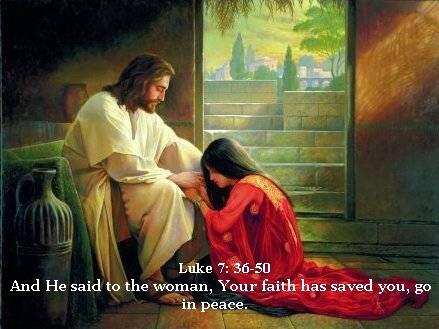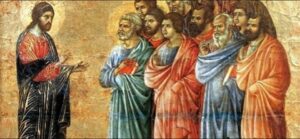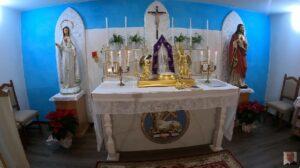
But He said to the woman, Your faith has saved you; go in peace.
ORARI S.MESSA DI GIOVEDI 7 APRILE 2022, ORE 8.00 – Feria Quinta infra Hebdomadam Passionis ~ III. classis
S.MESSA ONLINE DI DON ENRICO RONCAGLIA, su youtube channel:
https://www.youtube.com/channel/UCYYDj4O4e11cE7XNtngkoJA
e qui:
LITURGIA IN LATINO\ENGLISH:
https://divinumofficium.com/cgi-bin/missa/missa.pl
COMMUNIO PREGHIERE\PRAYERS:
https://www.proselitismodellascienza.it/2021/10/25/communio-e-comunione-spirituale/
EVANGELIUM E OMELIA\HOMILY:
Evangelium
Luc 7:36-50
In illo témpore: Rogábat Iesum quidam de pharisǽis, ut manducáret cum illo. Et ingréssus domum pharisǽi, discúbuit. Et ecce múlier, quæ erat in civitáte peccátrix, ut cognóvit, quod accubuísset in domo pharisǽi, áttulit alabástrum unguénti: et stans retro secus pedes eius, lácrimis cœpit rigáre pedes eius, et capíllis cápitis sui tergébat, et osculabátur pedes eius, et unguénto ungébat. Videns autem pharisǽus, qui vocáverat eum, ait intra se, dicens: Hic si esset Prophéta, sciret útique, quæ et qualis est múlier, quæ tangit eum: quia peccátrix est. Et respóndens Iesus, dixit ad illum: Simon, hábeo tibi áliquid dícere. At ille ait: Magíster, dic. Duo debitóres erant cuidam fæneratóri: unus debébat denários quingéntos, et álius quinquagínta. Non habéntibus illis, unde rédderent, donávit utrísque. Quis ergo eum plus díligit? Respóndens Simon, dixit: Æstimo, quia is, cui plus donávit. At ille dixit ei: Recte iudicásti. Et convérsus ad mulíerem, dixit Simóni: Vides hanc mulíierem? Intrávi in domum tuam, aquam pédibus meis non dedísti: hæc autem lácrimis rigávit pedes meos et capíllis suis tersit. Osculum mihi non dedísti: hæc autem, ex quo intrávit, non cessávit osculári pedes meos. Oleo caput meum non unxísti: hæc autem unguénto unxit pedes meos. Propter quod dico tibi: Remittúntur ei peccáta multa, quóniam diléxit multum. Cui autem minus dimíttitur, minus díligit. Dixit autem ad illam: Remittúntur tibi peccáta. Et cœpérunt, qui simul accumbébant, dícere intra se: Quis est hic, qui étiam peccáta dimíttit? Dixit autem ad mulíerem: Fides tua te salvam fecit: vade in pace.
Gospel
Luke 7:36-50
At that time, one of the Pharisees asked Jesus to dine with him; so He went into the house of the Pharisee and reclined at table. And behold, a woman in the town who was a sinner, upon learning that He was at table in the Pharisee’s house, brought an alabaster jar of ointment; and standing behind Him at His feet, she began to bathe His feet with her tears, and wiped them with the hair of her head, and kissed His feet, and anointed them with ointment. Now when the Pharisee, who had invited Him, saw it, he said to himself, This man, were He a prophet, would surely know who and what manner of woman this is who is touching Him, for she is a sinner. And Jesus answered and said to him, Simon, I have something to say to you. And he said, Master, speak. A certain money-lender had two debtors; the one owed five hundred denarii, the other fifty. As they had no means of paying, he forgave them both. Which of them, therefore, will love him more? Simon answered and said, He, I suppose, to whom he forgave more. And He said to him, You have judged rightly. And turning to the woman, He said to Simon, Do you see this woman? I came into your house; you gave Me no water for My feet; but she has bathed My feet with tears, and has wiped them with her hair. You gave Me no kiss; but she, from the moment she entered, has not ceased to kiss My feet. You did not anoint my head with oil; but she has anointed My feet with ointment. Wherefore I say to you, her sins, many as they are, shall be forgiven her, because she has loved much. But he to whom little is forgiven, loves little. And He said to her, Your sins are forgiven. And they who were at table with Him began to say within themselves, Who is this man, who even forgives sins? But He said to the woman, Your faith has saved you; go in peace.
DALL’OMELIA DI (FROM THE HOMILY BY) DON ENRICO RONCAGLIA – ORARI S.MESSA DI GIOVEDI 7 APRILE 2022, ORE 8.00

DALL’OMELIA DI DON ENRICO RONCAGLIA (*)
Dan 3:25, 34-45
In quei giorni Azaria pregò il Signore: «Signore Dio nostro, deh! non ci abbandonare per sempre, te ne scongiuriamo per amor del tuo nome, non distruggere la tua Alleanza; non ritirare da noi la tua misericordia, per amore di Abramo tuo amico, di Isacco tuo servo, di Israele tuo santo, ai quali parlasti, promettendo di moltiplicare la loro stirpe come le stelle del cielo, come l’arena che è sulla spiaggia del mare. Ed ora invece, o Signore, noi siam divenuti più piccoli di qualunque altra nazione, ora siamo umiliati per tutta la terra a causa dei nostri peccati.
Luc 7:36-50
In quel tempo uno dei Farisei lo pregò di andare a desinare da lui. Ed entrato in casa del Fariseo, si mise a tavola. Ed ecco una donna, che era peccatrice in quella città, appena seppe che egli era a mangiare in casa del Fariseo, portò un alabastro pieno di profumo; e stando ai piedi di lui, con le lacrime incominciò a bagnarne i piedi, e coi capelli del suo capo li asciugava, li baciava e li ungeva di unguento.
La preghiera di Azaria (nome babilonese di Daniele) e’ molto attuale. Il popolo di Israele e’ ridotto in miseria, con pochi membri, senza un tempio, senza sacerdoti ne un capo. Tutto cio’ e’ successo a causa dei peccati commessi. Anche oggi viviamo gli stessi eventi, di cui portiamo noi stessi la responsabilita’. Percio’ dobbiamo chiedere prima di tutto perdono dei nostri peccati!
Anche nel Vangelo la vicenda descritta e’ simile. Una donna peccatrice, lava con le sue lacrime e profuma i piedi di Gesu’, asciugandoli con i suoi capelli in segno di pentimento. Quello che veramente conta e’ pentirsi e chiedere perdono! Non abbiamo tempo di criticare e giudicare gli altri.
Cerchiamo dunque innanzitutto il nostro perdono davanti a Dio!
Sia lodato Gesu’ Cristo! Sempre sia lodato!
__________________
(*) Questo commento e’ scritto in tempo reale durante l’omelia. Mi scuso per l’eventuale misinterpretazione delle parole di Don Enrico.
FROM THE HOMILY BY DON ENRICO RONCAGLIA (**)
Dan 3:25, 34-45 In those days Azariah prayed to the Lord: «Lord our God, deh! do not forsake us forever, we beseech you for your name’s sake, do not destroy your Covenant; do not withdraw your mercy from us, for the sake of your friend Abraham, of your servant Isaac, of your holy Israel, to whom you spoke, promising to multiply their stock like the stars of heaven, like the arena that is on the beach of sea. And now instead, O Lord, we have become smaller than any other nation, now we are humbled all over the earth because of our sins.
Luke 7: 36-50 At that time one of the Pharisees asked him to go and dine with him. And going into the Pharisee’s house, he sat down to table. And behold a woman, who was a sinner in that city, as soon as she knew that he was eating in the Pharisee’s house, she brought an alabaster full of perfume; and standing at his feet, with tears she began to wet his feet, and with the hair of her head she dried them, kissed them and anointed them with ointment.
The prayer of Azaria (the Babylonian name of Daniel) is very current. The people of Israel are reduced to poverty, with few members, without a temple, without priests in their heads. All of this happened because of the sins committed.
Even today we are experiencing the same events, for which we bear the responsibility ourselves. Therefore we must first of all ask for forgiveness of our sins!
Also in the Gospel the story described is similar.
A sinful woman washes with her tears and perfumes her feet, drying them with her hair as a sign of repentance.
What really matters is repenting and asking for forgiveness. We don’t have time to criticize and judge others.
So let us first of all seek our forgiveness before God!
Praised be Jesus Christ. Always be praised!
___________________
(*) This comment is written in real time during the homily. I apologize for any misinterpretation of Don Enrico’s words

